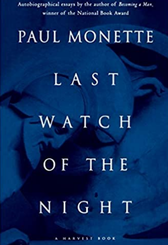Love and business and family and religion and art and patriotism are nothing but shadows of words when a man's [sic] starving! |
My Book World

Dear Paul,
I’m pretending that you gaze over my shoulder and peruse this piece about you and Last Watch of the Night. On pages 267-8, you discuss your hoarding of books, and I’m so glad to learn that I’m not the only one who does this. In recataloging my library of 1,300 books, a year ago, I realize that 300 of them remain unread, and, until now [during COVID, I am endeavoring to catch up, now having read fifty-six], yours has been one of them. I feel disgusted that I didn’t read it when it came out, but that was the first year of teaching AP English in high school, and my reading tasks were to stay at least one chapter ahead of my five classes of bright bulbs. So now to why I love this book and why it will never be dated.
Your essays, at times, seem long and meandering, but readers, make no mistake, they are ordered; they have organization. I believe it is a nonlinear order in which, for example, in an essay about travel, you mention sojourning with all three of your long-term relationships: Roger, Stevie, and Winston. What I like about this sort of organization is it allows the essayist to discuss bigger pictures, larger topics. In the first essay entitled, “Puck,” ostensibly about yours and Roger’s Rhodesian ridgeback-Lab mix, the piece spans out, in which this “noble beast” (28) is the glue holding you two lovers together until Roger succumbs to AIDS.
In another essay, “Gert,” you bring to light your first relationship with a lesbian, in this case, Gertrude Macy, a “maiden great-aunt” of one of your pupils. After she reads your novel manuscript, Gert asks, “Does it have to be so gay?” You answer:
“Oh, indeed it did. The gayer the better. I launched into my half-baked credo, invoking the name of [E. M.] Forster, the writer to whom I was most in thrall, and the one who had failed me the most as well. When Forster decided he dare not publish Maurice, for fear of the scandal and what his mother would think; when he locked that manuscript in a drawer for fifty years until he died, he silenced much more than himself. He put up a wall that prevented us, his gay and lesbian heirs, from having a place to begin” (43). I tend to agree, but one must think about the consequences for Forster if he had released Maurice. Lost revenue? Loss of a career? His life? Prison time?
Young gays need to read you, just as we read Forster and Isherwood, our forebears, so that they may know from whence they come. They must realize that the fight for freedom and equality is never over. It just shifts from one opponent to another. You fought to bring AIDS into a national focus, and perhaps the young will see that the COVID-19 battle is much the same: unless we change our national leadership COVID will be with us forever, just like AIDS is still with us. One must thank you for your fight, which ended all too soon. You would just now be enjoying a long-deserved homage at the ripe age of seventy-five.
NEXT FRIDAY: My Book World | Byron Lane's Novel A Star Is Bored



 RSS Feed
RSS Feed